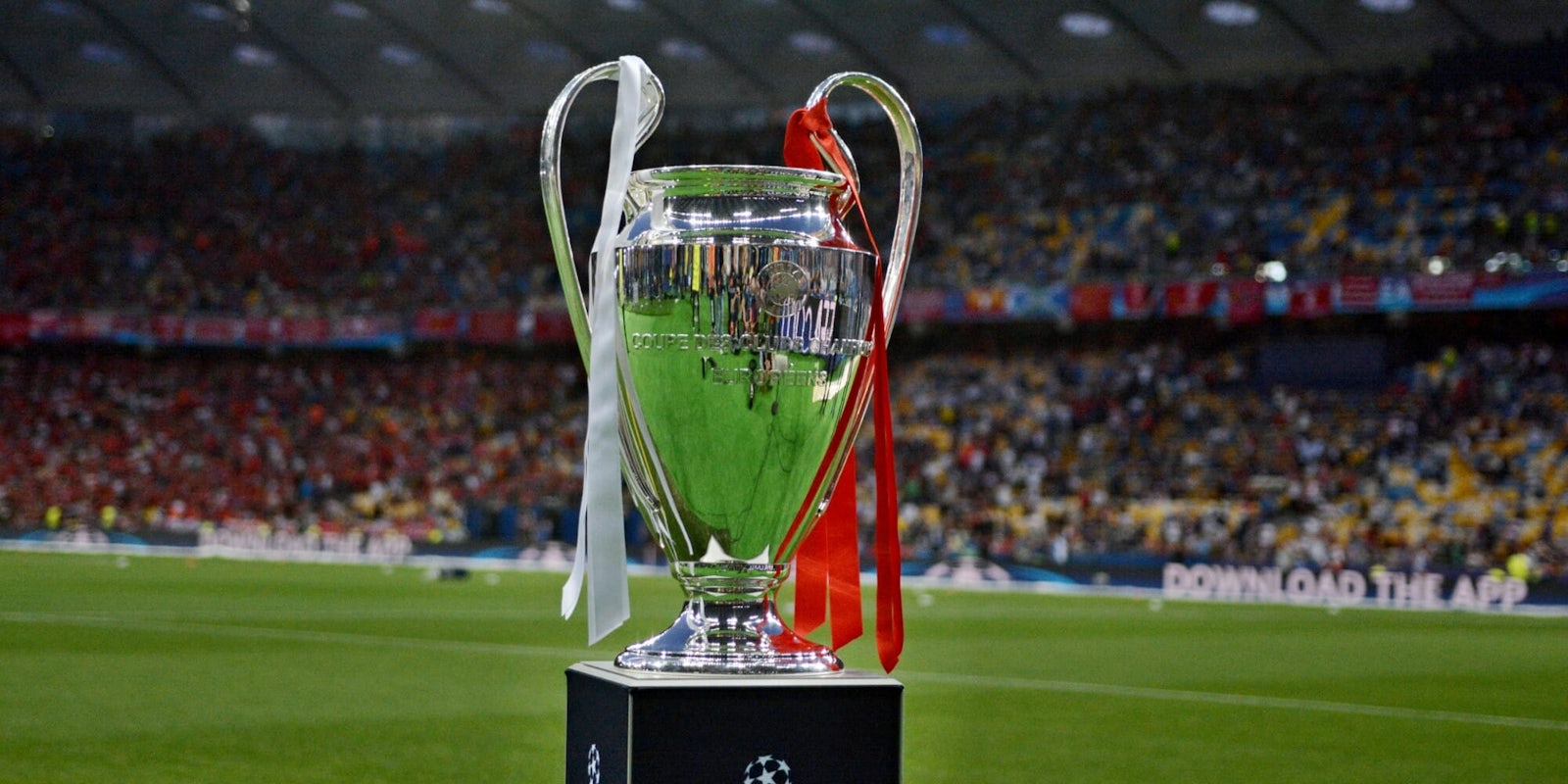Imagine if you could take the best clubs teams that Europe has to offer and have them play each other. You might have Real Madrid take on Bayern Munich, Barcelona take on Liverpool, and PSG take on Juventus, which sounds pretty fantastic and star-studded and a must watch for soccer fans. That’s the UEFA Champions League in a nutshell: an annual tournament in which Europe’s best pro soccer teams—and thus, many of the world’s best players—face off for one of soccer’s most prized trophies.
What is the UEFA Champions League?
Started in 1992—building from the European Champions Cup that only featured league winners from Europe’s prime soccer-playing nations—the UEFA Champions League features the top 32 European club teams. In June, UEFA holds play-in matches to select six slots; those teams, plus 26 pre-qualified teams, make up eight groups of four teams each, which play in a group stage, much like World Cup entrants do between September and December. (Matches are typically on Tuesdays and Wednesdays to fit in between the weekend matches teams play in their respective leagues.)
From that field, the first and second place teams in each group advance to a 16-team knockout round that starts in February and goes through May; each round leading up to the final has two legs, with each team playing a home and away match to determine who advances and who goes home. The final, typically in late May or early June, is a single match at a neutral site determined months in advance. The Wanda Metropolitano in Madrid, home stadium for Atletico Madrid, will host the 2018-19 finals on June 1.
Which UEFA Champions League teams should I know?
Though the participating teams vary from year to year, there are a number of perennial contenders able to qualify each year. The best leagues in Europe get multiple invitations: For the 2018-19 season, England, Germany, Italy, and Spain each got four slots, France and Russia got three slots each, a larger group (including Portugal, Belgium, and the Netherlands) got 2 slots each, and a number of other countries get a single slot. UEFA defines Europe broadly: Israel, Kazakhstan, and Georgia are counted among the 55 UEFA nations.
From Spain, you can typically expect that Barcelona, Real Madrid, and Atletico Madrid will be in the mix, with Sevilla or Valencia rounding out the top four. In Germany, Bayern Munich and Borussia Dortmund are typical entrants, with Schalke and Hoffenheim being part of the 2018-19 equation, but RB Leipzig is looking to be part of the 2019-20 party in its quick soccer ascendancy since it became part of the Red Bull soccer family. Juventus has dominated Italian soccer in recent years, with Napoli, Roma, AC Milan, and Inter Milan among the other Serie A teams typically in the mix.
England has six perennial contenders—Manchester City, Manchester United, Liverpool, Arsenal, Chelsea, and Tottenham Hotspur—but only four spots. Other familiar faces include Scotland’s Celtic, Portugal’s Porto, The Netherlands’ Ajax, and Galatasaray’s Turkey. There’s also a wild card: the winner of the Europa League tournament is allowed into Champions League.
UEFA Champions League live stream: Watch Champions League matches for free
Each of the following services carries TNT, providing a one-week trial and therefore an easy way to watch UEFA Champions League matches for free. (Univision Deportes, available via FuboTV, also carries matches with Spanish-language commentary.)
1) Sling TV
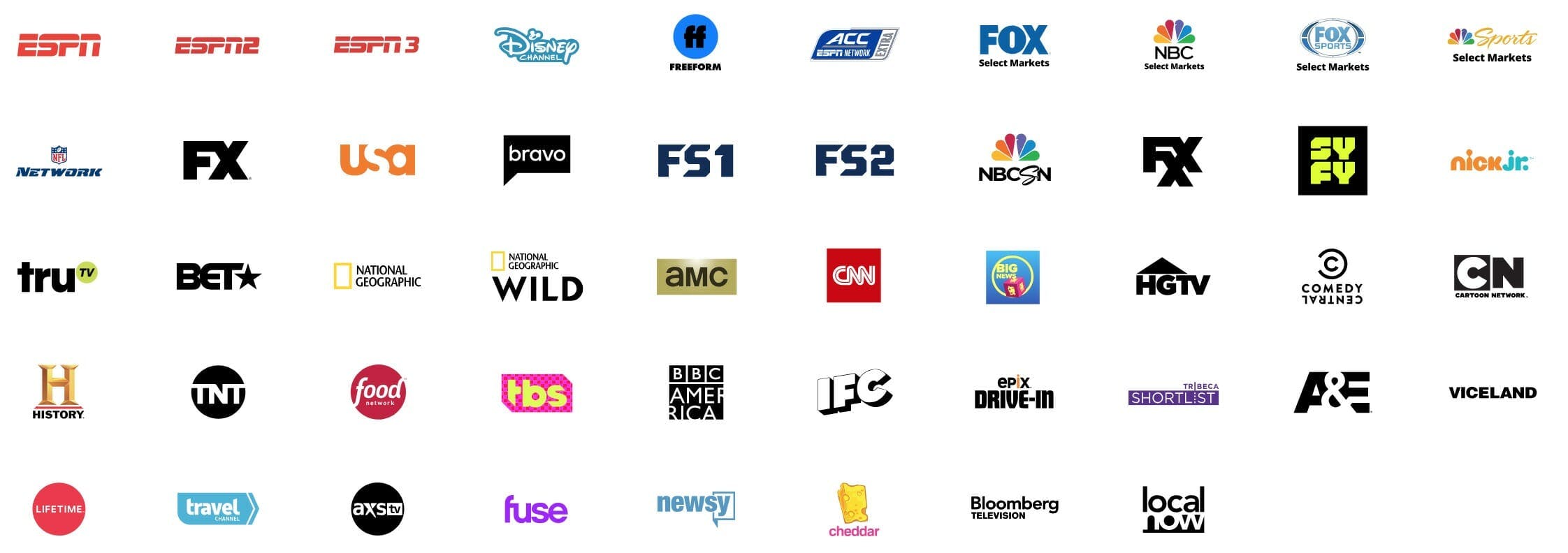
- Sling TV pricing: $25-$40 per month (after a 7-day free trial)
- Sling TV devices: Amazon Fire Stick and Fire TV, Apple TV, Android TV, Roku, Xbox One, Google Chromecast, Oculus Go, Microsoft Edge, and iOS and Android devices
- Sling TV local channels: NBC, Fox (check your local availability here)
Sling TV provides two base channel package options, each priced at $25 per month. Sling Orange includes three ESPN channels, while Sling Blue includes sports channels like NFL Network, FS1 and FS2, NBCSN, and local channels. If you’re Team “Why Not Both,” Sling Orange + Blue combines the two for just $40 per month. To add beIN SPORTS and maximize your soccer-watching potential, you’ll want to add either Sports Extra: Sling Orange ($5 per month) or Sports Extra: Sling Blue ($10 per month). (The latter also includes NFL RedZone.)
Spanish-speaking viewers have quite a few options. For bilingual families, you might consider the Español: Best of Spanish TV package for either Sling Orange or Sling Blue for 24/7 specialty channel LaLiga TV and beIN SPORTS Connect: Channels 4-9, which features matches from LaLiga, Ligue 1 and Copa del Rey, among others. Both packages cost $5 per month after your free trial. Sling TV Latino is another Spanish-language package for $10 per month, including NBC Universo, History en Español, and—of import to soccer fans—four beIN SPORTS channels. (And choosing Sling TV Latino + Sling Orange for $30 per month gives you access to ESPN Deportes.) For more information, check out our guide to Sling TV channels and our Sling TV review.
2) FuboTV
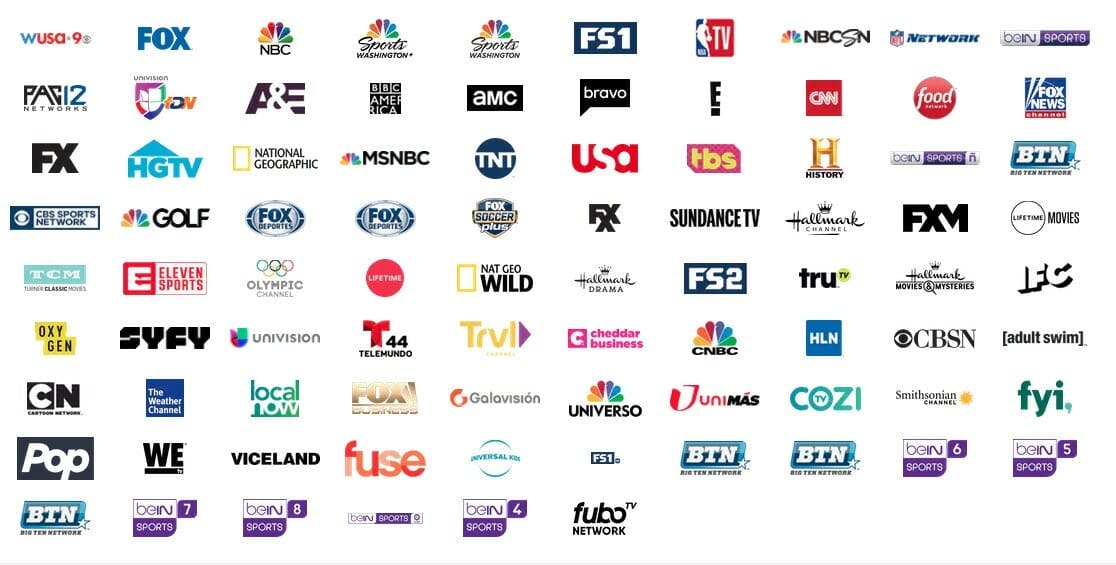
- Cost: $44.99 for the first month, $54.99 per month thereafter (after a 7-day free trial)
- FuboTV devices: Roku, Apple TV, Amazon Fire Stick and Fire TV, Android TV, iOS and Android devices
- FuboTV local channels: Fox, NBC, CBS (check local availability here)
FuboTV is a solid TV streaming service option, whether your tastes run to entertainment (AMC, Syfy, FX), news (MSNBC, CNN), or sports (NBA TV, NFL Network). If you’re a soccer fan, however, it will appear tailor-made for you, with 10 beIN SPORTS channels, NBCSN, FS1, FS2, UniMás, and Champions League actions via TNT all on tap. If you can’t watch a match live, FuboTV offers a three-day replay for each match and 30 hours of cloud DVR. (Check out the complete FuboTV channels list.)
FuboTV also has bilingual families in mind; each subscription comes with UniMás, Galavisión, NBC Universo, beIN SPORTS, Univision, and Fox Deportes. An extra $7.99 per month will bring you Latino Plus, which includes CNN en Español and TyC Sports among its offerings.
3) PlayStation Vue
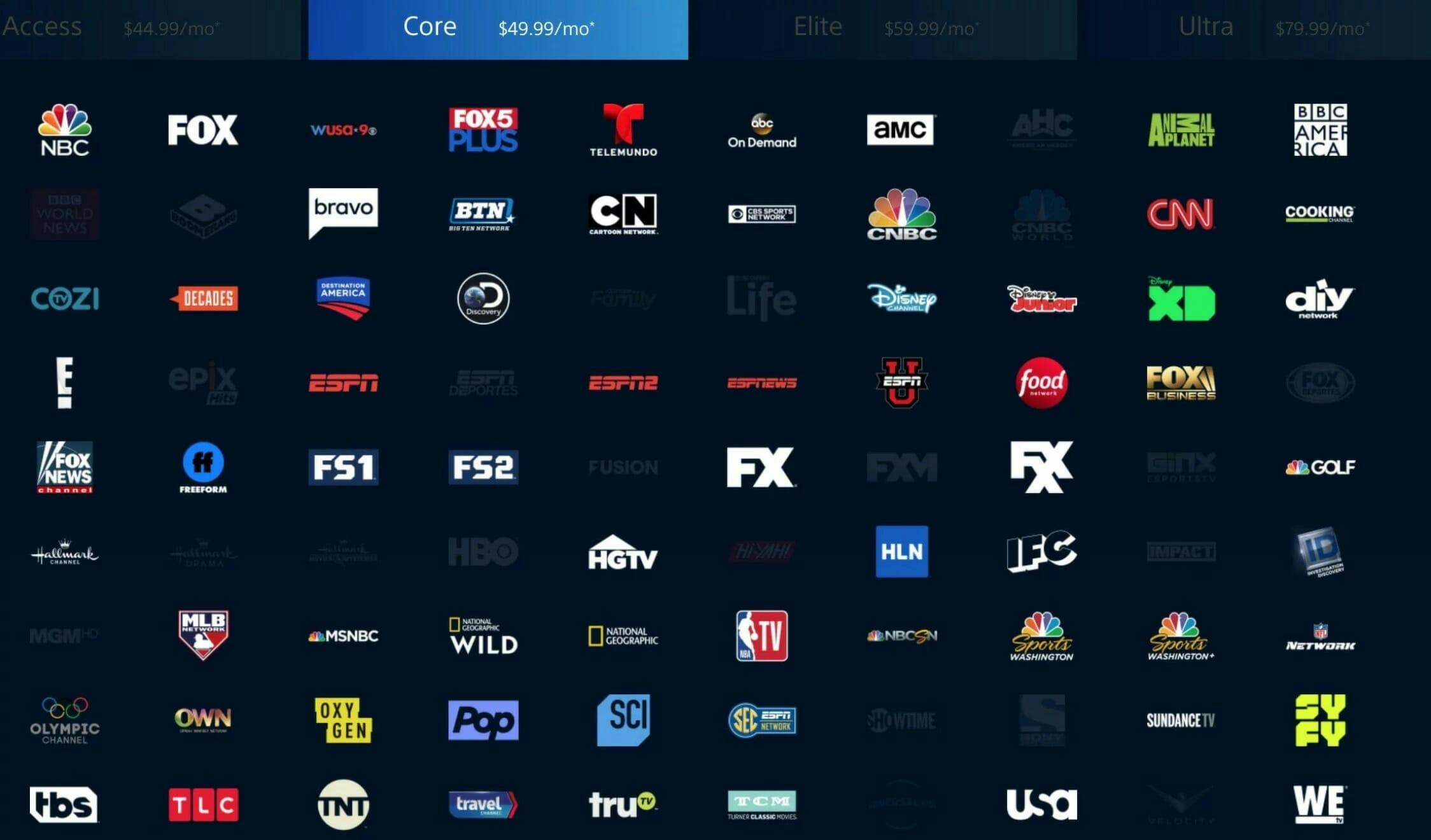
- Cost: $44.99-$79.99 per month (after a 7-day free trial)
- PlayStation Vue devices: PlayStation 3 and 4, Roku, Amazon Fire Stick and Fire TV, Google Chromecast, Kodi, iOS and Android devices
- PlayStation Vue local channels: NBC, Fox, ABC, CBS (enter your ZIP code here to check your availability)
PlayStation Vue is a fantastic option for soccer fans who already own a PlayStation console, but this streaming platform is available on a variety of devices. TNT is part of a basic package of channels that offer soccer and other sports program, and the options increase at the Core, Elite, and Ultra levels.
4) Hulu with Live TV

- Cost: $44.99 per month (after a 7-day free trial)
- Hulu devices: Roku, Apple TV, Google Chromecast, Amazon Fire Stick and Fire TV, Xbox One, Xbox 360, Nintendo Switch, and iOS and Android devices
- Hulu local channels: ABC, CBS, Fox, NBC, the CW (check your local availability here)
Hulu with Live TV includes sports programming among its broad spectrum of offerings, and as a subscriber to the service, you’ll get free access to Hulu’s sizable on-demand library. (Check out the full list of Hulu Live TV channels.)
5) YouTube TV
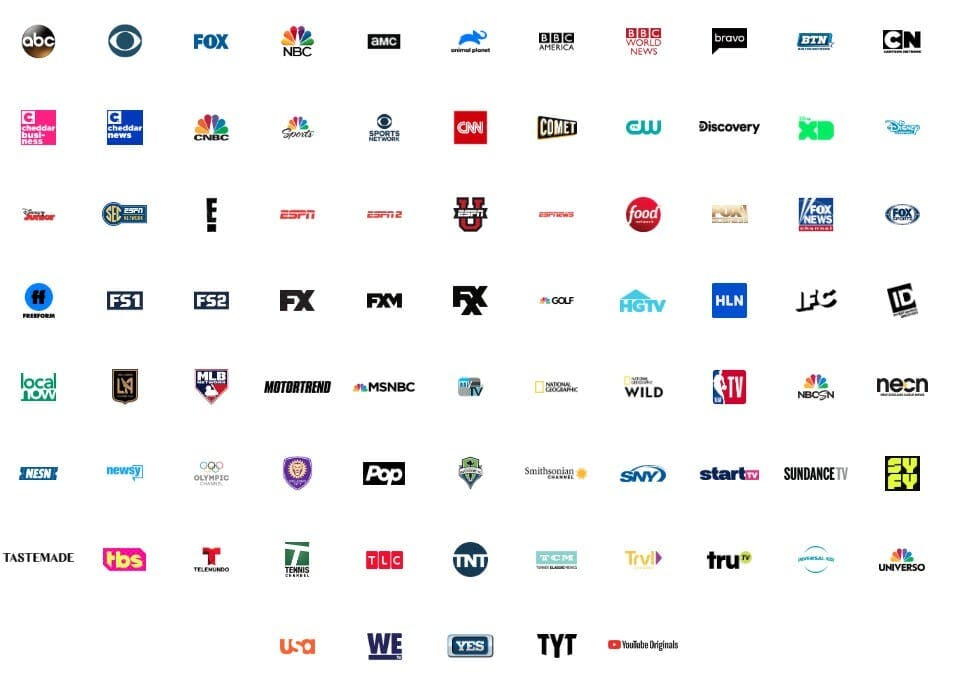
- Cost: $50 per month (after a 7-day free trial)
- YouTube TV devices: Google Chromecast, Roku, Apple TV, Android TV, Xbox One, iOS and Android devices
- YouTube TV local channels: NBC, CBS, Fox, ABC, the CW (enter your ZIP code here to check your availability)
YouTube TV is a great option for soccer fans, including TNT for Champions League matches, NBCSN for Premier League matches, and broadcasting partnerships with three MLS teams. (Take a look at the full list of YouTube TV channels here.)
UEFA Champions League top scorers
The top scorers in the tournament to date (heading into the June 1 finals) are:
Lionel Messi, Barcelona: The legendary Argentine player lapped the competition with 12 goals throughout the tournament; he was a hero against Liverpool in the first semifinal leg but couldn’t produce a goal when his team needed it the most in the second leg.
Robert Lewandowski, Bayern Munich: The Polish striker has been an integral piece of this dominant German team in recent years, but may seek a new challenge soon. Rumors have him MLS-bound.
Sergio Agüero, Manchester City: The Argentine striker has led the talented team’s quest for trophies in 2019; they already have a League Cup and look to add a Premier League title and FA Cup to their coffers, but a Champions League title will have to wait for next season.
Cristiano Ronaldo, Juventus: The all-time Champions League scoring king added six goals to his lofty totals in a new uniform. After leading Real Madrid to three straight titles between 2016 and 2018, he moved to Juventus and ended up ousted by an Ajax team that made a remarkable run.
Dušan Tadić, Ajax: The veteran midfielder was a member of an Ajax team that came tantalizingly close to the Champions League finals. It took a late miracle goal by Spurs’ Lucas Moura in the dying throes of the second leg to finally defeat the team that took out defending champions Real Madrid and a tournament favorite in Juventus.
UEFA Champions League winners
- 2018: Real Madrid (Spain)
- 2017: Real Madrid (Spain)
- 2016: Real Madrid (Spain)
- 2015: Barcelona (Spain)
- 2014: Real Madrid (Spain)
- 2013: Bayern Munich (Germany)
- 2012: Chelsea (England)
- 2011: Barcelona (Spain)
- 2010: Inter Milan (Italy)
- 2009: Barcelona (Spain)
Here’s a complete list of the winners and runner-ups, dating back to the first European Cup winners in 1956.
The Daily Dot may receive a payment in connection with purchases of products or services featured in this article. Click here to learn more.

